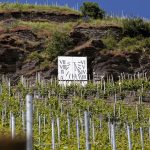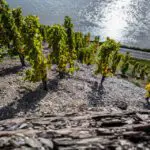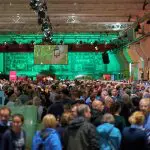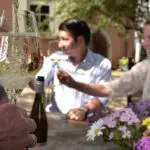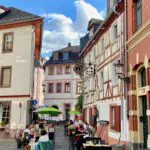
Since I specialize in wine tours for English language visitors to Germany, I am always interested in what is being published on an international level about German wine. Which has been very little recently.
Enters German native and UK based MW Anne Krebiehl and her book ‘The wines of Germany’, which hit the shelves this September. We ignore the surprisingly old-fashioned cover to quickly find out about its extremely fresh contents.
The first chapters step us through background essentials like German wine history, German wine law, the key varietals Riesling and Spätburgunder (=Pinot Noir), Germany’s take on sparkling wines (Sekt), and – extremely timely – climate change in German vineyards.
Now that we are equipped with all basics, Anne sends us on a journey through 12 German winemaking regions. Each chapter starts with a thorough introduction of the region, followed by profiles of winemakers who captured Anne’s interest. While it is always arguable which wine estates to include or not include in a book about German wines, I enjoyed the balance of both historic estates and newcomers. For Rheingau for instance one will find classics like Schloss Vollrads but also more recently founded wineries like Weingut Bibo Runge, Weingut Eva Fricke, or Weingut Kaufmann.
There are info-boxes all across the chapters covering good-to-know details about geography, grape varietals, wine styles, and other particularities, sometimes related to a region, sometimes not, but always interesting. (An index of these would have done no harm J).
The German-English glossary at the end is an almost invaluable find for me as a wine guide, dealing with different languages and wine culture. It provides translations and – where not available – English descriptions of German wine terms.
You plan a wine tour in Germany? This book is for you. ‘The Wines of Germany’ is a great read for anyone with an advanced interest in German Wines. Plenty of direct quotes show how Anne obviously involved winemakers in the research and writing process. The introductory chapters are very well presented in a clear, matter-of-factly language, even managing to lay out the specialties of Germanys confusing wine laws and regulations in simple words.
Stay away though if you are looking for info-graphic presentations and colourful maps. This is many shelves away from a coffee-table book, definitely serious stuff. The book is packed with information in tightly packed words and very stingy use of paragraphs – a bit more colour and possibly a pinch more humor would not harm. But then, it is only the cover and the presentation confirming preconceptions about Germany – not the contents.
Very happy we have our copy!
Anne Krebiehl is also an expert on sparkling wines. Here’s a summary from a tasting of Sekt event she hosted in 2018.

